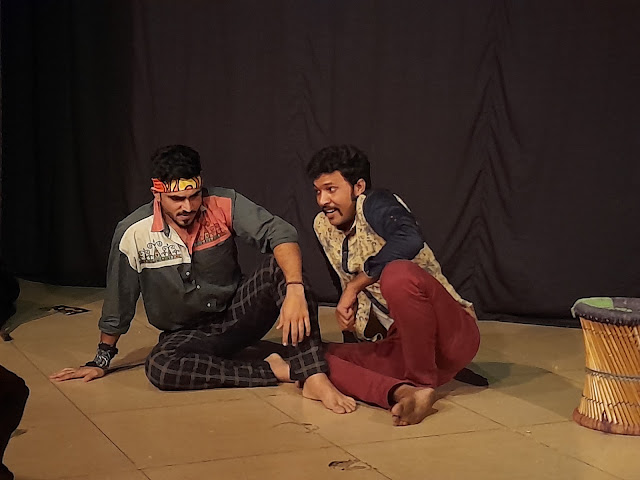(Drama-review)
The 'biting' trespasses the echelons of the nerves and mind and reaches your soul, questions straight the premise of your existence. You find yourself heavily stirred to reconsider your own 'make'. “Shaam Kahaaniyon Ki” was not just a montage of short stories, it was an all-time quintessence of satires in Hindi-Urdu literature.
To let you peep into the event, here is a little piece presented there in a semi-acting style. (I am proud to say that the following terse sentences can only be written in the dearest "Hindi' and I challenge, not in any other language in the universe)
...इतने बड़े नेता और ‘ता’ गायब। उन्हें सेक्रेटरी ने बताया कि सर आपका ‘ता’ नहीं मिल रहा। आप सिर्फ ‘ने’ से काम चला रहे हैं। नेता बड़े परेशान। नेता का मतलब होता है, नेतृत्व करने की ताकत। ताकत चली गई, सिर्फ नेतृत्व रह गया। ‘ता’ के साथ ताकत गई। तालियां गईं, जो ‘ता’ के कारण बजती थीं। नेता बहुत चीखे। पर जिसका ‘ता’ चला गया, उस नेता की सुनता कौन है? खूब जांच हुई पर ‘ता’ नहीं मिला। नेता ने एक सेठ से कहा, ‘यार हमारा ‘ता’ गायब है। अपने ताले में से ‘ता’ हमें दे दो।’ सेठ बोला, ‘यह सच है कि ‘ले’ की मुझे जरूरत रहती है, क्योंकि ‘दे’ का तो काम नहीं पड़ता, मगर ताले का ‘ता’ चला जाएगा तो लेकर रखेंगे कहां? सब इनकम टैक्स वाले ले जाएंगे। कभी तालाबंदी करनी पड़ी तो? ऐसे वक्त तू तो मजदूरों का साथ देगा। मुझे ‘ता’ थोड़े -देगा।’ नेता ने सेठ को बहुत समझाया। जब तक नेता रहूंगा, मेरा ‘ता’ आपके ताले का समर्थन करेगा। आप ‘ता’ मुझे दे दें और फिर ‘ले’ आपका। लेते रहिए, मैं कुछ नहीं कहूंगा... (from a story "नेतृत्व की ताकत" by Sharad Joshi)
One-by-one story bolly-firing of humour from a catapult was what was happening there and it was impossible for a hynotised person like me to count the stories. I guess it was around ten.
In "Baadshaahat ka khatma" a beautiful young lady makes a blind telephonic call to a man who is a typical pauper living on footpath but have been in access of a telephone just because he has been requested by his friend to sit in the office for some days till he returns to his office. The lady has a honey-coated voice. The pauper man picking up his call loves her voice and have a lot of romantic ideas about her. The surprising fact is the beautiful lady is very much interested in the pauper man and that man there does not even aspire to get her name, address or phone number. He is always indulged in a novel some of whose last pages are torn off and missing. When asked he truly states that this phone is available only till the coming back of his friend who works in this office. Then the lady requests that he should inform just before the arrival of his friend so that she could give her name and address. It is obvious that the lady wants to keep in touch with her distant lover but this man is quite aware of his limitations. The lady informs that she will go to some place for two days and would not be able to make him a call in that period. When she comes back to her home, she decides to give her name and address to the man on telephone so that she should not miss her contact. That man on the other end picks up the call and keeps up his promise by saying that "my kingdom is now going to end" before he dies of his illness.
The whole story was presented with the utmost poignancy and fully in acting form. The honey-tongued lady actor looked really very beautiful and young and the bearded man on the other side near the telephone was with a novel and a blanket truly giving life to the character. Amazing show!
In another story 'License' by Manto, a charming unmarried girl gets on the 'tonga' to go to her relatives who are waiting for her a few miles away. The coachman is stung by the beauty of the girl and airs the signals of love. After some initial hesitations the girl too likes the ways of the coachman and both fell in love for each other. She forgets where to get down and goes away with the coachman. The relatives of the girl is flabbergasted and cuts off their connections with the girl. The girl marries the coachman and start living happily together. But after some days, the coachman dies of a disease. In this situation the girl (now coachman's wife) has to take care of the job of driving her 'tonga' for her livelihood. As she is young and beautiful, she never lacks passengers and people ride her tonga just to bring her closer. She notices that people are not interested in going to their destination and just enjoy sitting beside her". Some people stares on her body, some passes obscene comments. The lady bears it all for her livelihood and tries to keep herself habituated with this condition. Day by day, more and more infamy gathers on to her and she is engulfed by the most redoubtable personality in the locality. The matter reaches to the drivers association and they cancels the license of the lady's coachmanship. She meets the executive body of the association, prays to allow her to pursue her profession of tonga-driving. She begs for the mercy. On this, the executive body gives a rebuff and says abusively her to practice prostitution. As the lady does not know anything else and she had to earn for her livelihood, she really became a prostitute from the coming day. The story ends like "... and from the next day she got the license to undergo prostitution."
This story was also presented in a mix of narration and acting. Impressive show!
In another story perhaps by Harishankar Parsai, there are two friends. One friends travels to many kilometers and meets his friends frequently and keeps on his garrulous arguments. He is an epitome of turncoat. He starts putting his arguments in favour of something but just at the nick of the response of his friends, he begins opposing it. Means, whatever his listener friends likes he will oppose it and the tendency is to such a extreme extent that the listener friend is confused whether he should approve or disprove of the idea of the speaker. It is but obvious that the listener friends has no way but to bears it all. Sometimes the speaker friends is so wild and forceful that he becomes violent on his arguments and gives a blows for favourable or unfavourable responses to him. Then a day comes when the speaker friend fails to get selected for a job. Though he had appeared for it and had answered the questions well still he is not selected because of partiality of the selectors. After failure in the recruitment-exam, the speaker friend is mentally depressed. When the listener friend comes to meet him, he expresses his support for the speaker friends and agrees with his views that the system is corrupt. Surprising he sees that the speaker and listener both have agreed on the point.
The message is that you take every issue as a debatable thing and just a matter of intellectual pleasure till the pinch of it reaches your self. Then you come to senses and understands that it is not just a matter of verbal play but really a serious matter.
In a story "Mr Moinuddin" by Sadat Hasan Manto, a socialite wife of a rich person is his darling lady. He is blind in his love to such an extent that he does not mind if she dances with other men also in parties of the clubs. He believes it is a sign of modern fashion bourgeois culture. One day, the wife says Moinuddin that she wants to divorce him and marry other richer man with whom she likes to dance in the clubs. Mr. Moinuddin feels bad but bears it and allows her to live with the other rich man but requests her to live in his house alternatively after duration of some days. This arrangement of living for some days with Mr Moinudding after many days with others would be helpful to maintain the high-status of Mr. Moinuddin in the society as he would be able to proclaim that everything is well in his conjugal life. Some days this merrymaking continues. After some days the richer person and new husband dies because of heart attack. Because of the His all wealth comes under the control of this lady now who is still known as Moinuddin's wife. Now Mr. Moinuddin rejects her and says that now he does not want to live with her even for a single day. He also gives all of his wealth including the house to his corrupt wife and leaves the house. So, now this lady has huge empire of wealth with her but not a single person who loves her or on whom she could trust.
The director Hidayat Sami has done an incredible job. The credit goes to him not just in the manner he was able to extract remarkable job from the boys and girls who are still under training, but also in the selection of these representative stories. He also showed how with very thin mass of set-properties, excellence can be brought in terms of impact on the viewers. Like in "Netritwa Ki Taakat', the whole story is just being narrated by a character and the viewers are engaged the whole way he dresses himself up as a 'Neta' and it is not a chance that the end of dressing up and the story comes at the nick of time.
The actors were Abhineet Choudhary, Nishu Aggrawal, Shivam Yadav, Krupal Raval, Dhrreti Bhatt and Aashitosh Solanki. Their performance was superb in terms of style of dialoogue delivery but in case of some of the male actors, the pronunciation and grammar were a little bit of issues which can be removed just by more and more presentations like this.









.jpg)

.jpg)








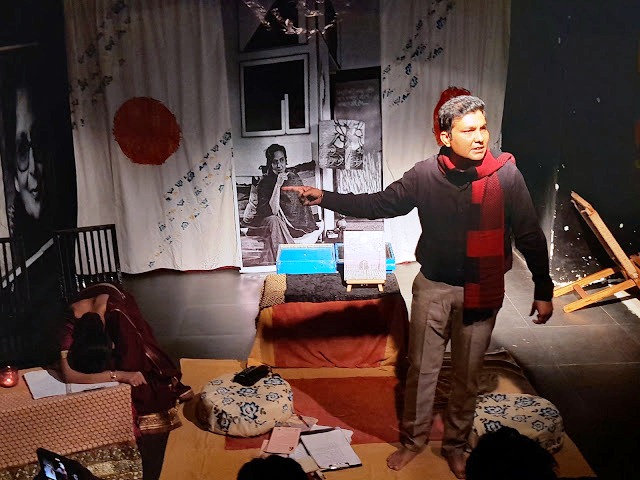


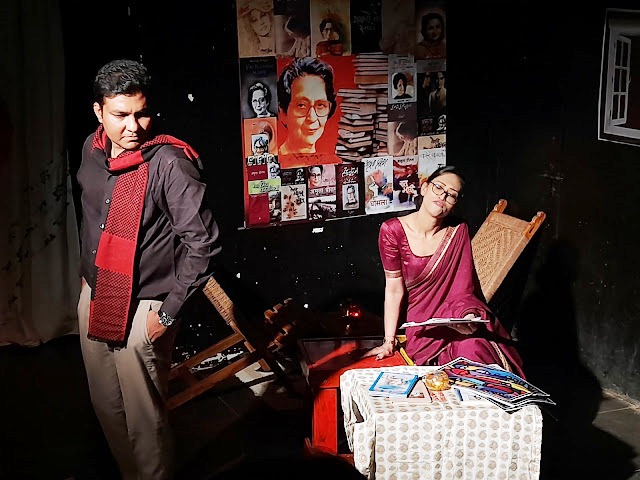



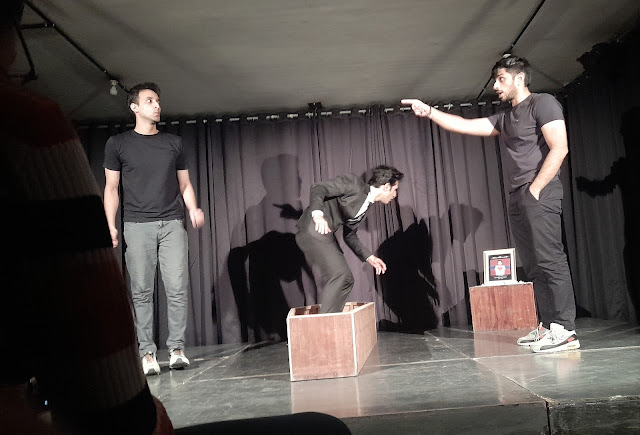
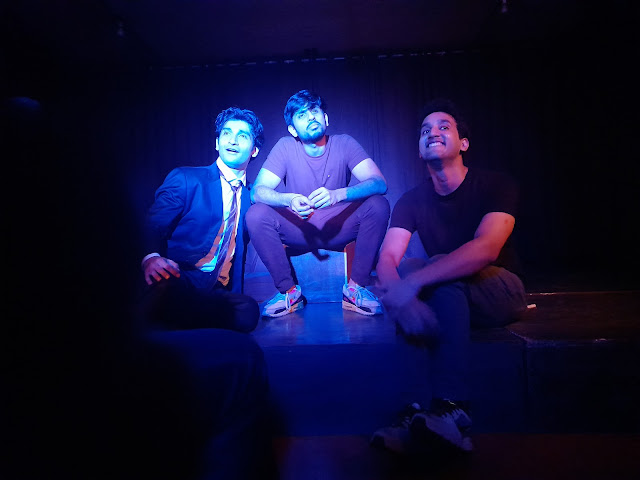
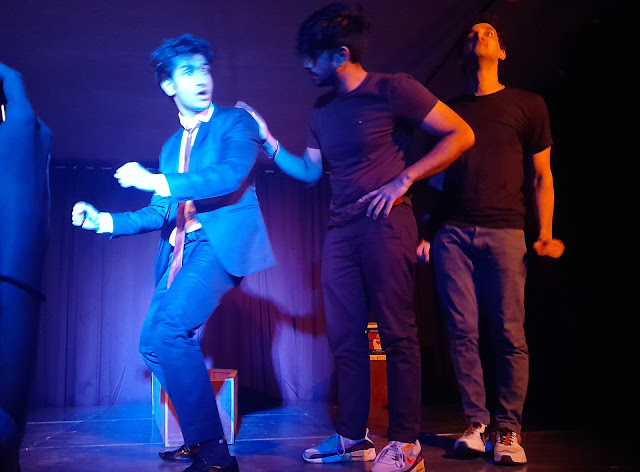



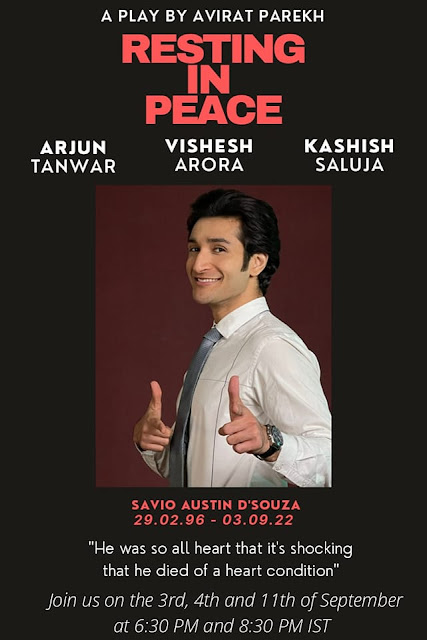
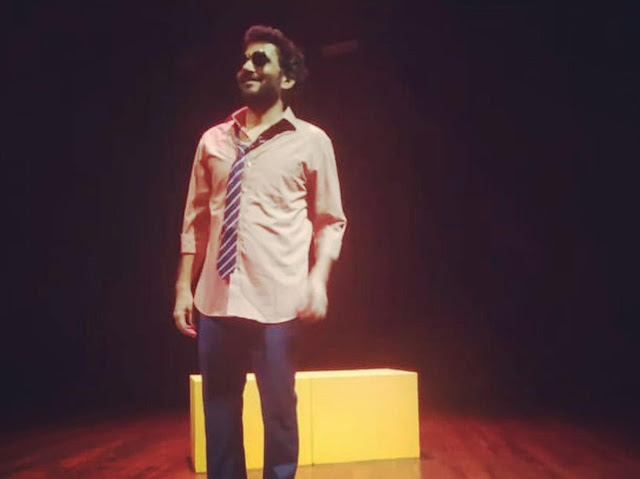


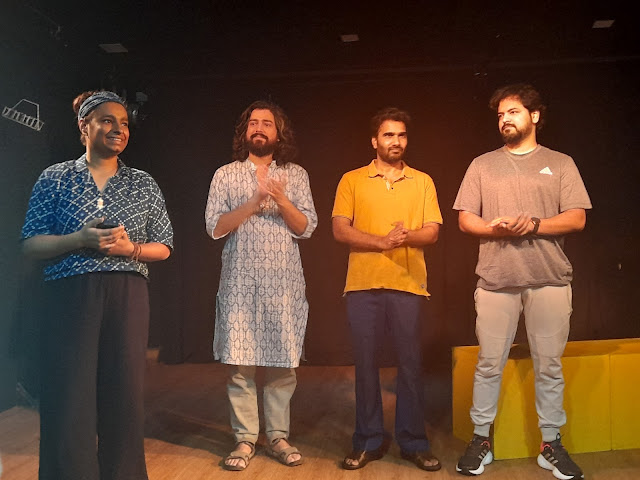






.jpg)







